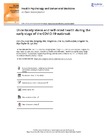| dc.contributor.author | Zhu, Zan | |
| dc.contributor.author | Wu, Dan | |
| dc.contributor.author | Wei, Kiagong | |
| dc.contributor.author | Liu, Yingbi | |
| dc.contributor.author | Xu, Zhe | |
| dc.contributor.author | Jiao, Guihua | |
| dc.contributor.author | Yu, Lingwei | |
| dc.contributor.author | Taylor, Alyx | |
| dc.contributor.author | Zou, Liye | |
| dc.date.accessioned | 2023-03-08T15:13:57Z | |
| dc.date.available | 2023-03-08T15:13:57Z | |
| dc.date.issued | 2023-02-15 | |
| dc.identifier.citation | Zhu, Z., Wu, D., Wei, K., Liu, Y., Xu, Z., Jiao, G., Yu, L., Taylor, A., & Zou, L. (2023). Uncertainty stress and self-rated health during the early stage of the COVID-19 outbreak. Health Psychology and Behavioral Medicine, 11(1), 2173202. Available online: https://doi.org/10.1080/21642850.2023.2173202 | en |
| dc.identifier.issn | 2164-2850 | |
| dc.identifier.uri | https://aecc.archive.knowledgearc.net/handle/123456789/178 | |
| dc.description | Available under License - Create Commons Attribution: https://creativecommons.org/licenses/by-nc/2.0/ | en |
| dc.description.abstract | Objectives
The COVID-19 crisis caused unparalleled uncertainty stress and health-related symptoms among Chinese residents. This study aimed to characterize stress status during the early stage of the pandemic and explore the inner mechanism between uncertainty stress and self-rated health.
Setting/participants
A cross-sectional design was conducted online from February 7 to 14, 2020. A total of 2534 Chinese participants were surveyed.
Main outcome measures
Uncertainty stress, negative affect, sleep quality, and health status were measured by self-report. A sequential mediation model using bootstrapping method was applied to test these relationships.
Results
Age, place of residence, marital status, occupation, household annual income, infection, and quarantine status significantly correlated with uncertainty stress. Higher uncertainty stress was negatively related with self-rated health (r = −0.256, p < 0.01) and positively associated with higher negative emotions (r = 0.646, p < 0.01). The sequential mediation model found total indirect effect (β = −0.014, 95%C.I. = −0.017−0.010) and direct effect (β = −0.010, 95%C.I. = −0.015−0.005) were significant in the relationship between uncertainty stress and self-rated health with mediating by negative affect and subjective sleep quality.
Conclusions
Findings provided evidence-based information for stakeholders designing and implementing intervention strategies by providing psychological consultation services and public education to manage uncertainty stress and minimize the damage of negative affect and poor sleep. | en |
| dc.language.iso | en | en |
| dc.publisher | Health Psychology and Behavioral Medicine | en |
| dc.subject | Uncertainty stress | en |
| dc.subject | Negative affect | en |
| dc.subject | Subjective sleep quality | en |
| dc.subject | Self-rated health | en |
| dc.title | Uncertainty stress and self-rated health during the early stage of the COVID-19 outbreak | en |
| dc.type | Article | en |
| dc.identifier.doi | https://doi.org/10.1080/21642850.2023.2173202 | |
